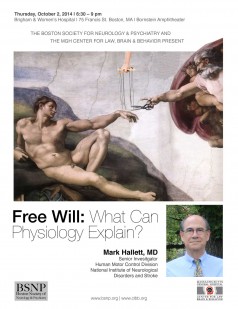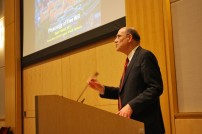
While we may believe that we choose and direct our movements consciously, the physiology of human motor control provides compelling evidence that this sense of conscious decision – free will – is a perception only.
On Thursday, October 2, 2014, at the Bornstein Amphitheater at Brigham and Women’s Hospital, CLBB and the Boston Society for Neurology and Psychiatry co-sponsored an event exploring how an understanding of human motor control can contribute to the question of free will. Video of the event is included below in its entirety and at our Vimeo page.
Mark Hallett, MD, Senior Investigator in the Human Motor Control Division at the National Institute of Neurological Disorders and Stroke, presented research on the physiological and neurological underpinnings of voluntary and involuntary movement and movement disorders and examined its implications for free will. Dr. Hallett has published extensively for both scientific and popular audiences on this subject. Relevant work includes “Seeking free will in our brains: A debate” (2007), commissioned by Cerebrum, between Hallett, a neurologist, and Paul McHugh, MD, a psychiatrist, on the meaning of free will and whether brain science can, now or ever, fully explain it. Hallett also wrote “What does the brain know and when does it know it“, a chapter for the book Exploring the Illusion of Free Will and Moral Responsibility (2012), edited by Greg Caruso.



FREE WILL IS A PERCEPTION
The question of free will is grounded in the perennial mind-body question – are the mind and the brain separate, or the same, things? While it is the consensus of scientists that there is no difference between the two (monism), Hallett warned that a weak form of dualism is often leaned on to support a perception that a “free will force” is at play. This perception of agency or volition, in our decisions and our movement, is a feature of consciousness, philosophy’s age-old “hard problem–” and this perception of free will, Hallett claimed, is a perception only.
WE LIVE IN THE PAST
The physiology of human motor control seems to undermine the idea that we are aware and in charge of our movements as we make them. Hallett reviewed a series of replicable studies in physiology (beginning with Libet, 1983) that asked subjects to induce voluntary movements, and found that brain activity to induce the movement occurred significantly before subjects declared intention to move. An fMRI version the study (Soon et al, 2008) showed that the outcome of a decision can be encoded in brain activity up to ten seconds before it reaches the subject’s consciousness. This unconscious initiation by the brain of voluntary movements well in advance of consciousness implies that our subjective sense of reality (awareness) is actually slightly in the past.
Other studies showed that there is a point along the brain’s preparation to move after which the subject cannot veto some movements (Matsuhashi & Hallett, 2008); that the brain can be preparing to make voluntary movements while participants are thinking about something else (Schneider et al, 2013); and that subjects tend to over-estimate the “self-agency” or causal involvement they had in a given activity based on real-time examination of neural networks (Nahab et al, 2011).
FREE WILL? WE ARE OUR BRAINS
Hallett pointed out that the language we use to reference our agency in the world contains a problematic implicit dualism. To say “you know what your brain is doing” does not make sense, Hallett claims, because “you are your brain.” This objection to dualism combined with the science that shows that our brains precede our subjective awareness of our actions has interesting implications for practical and legal conceptions of responsibility and agency.
IMPLICATIONS FOR LAW
While the science complicates our ideas of free will and agency, a definition of autonomy is required by a legal system implicitly grounded in the concept of responsibility. Hallett put forth a definition that he sees as compatible with the science, legally useful, and distinct from assumptions that we are in free control of our internal states (Dubljevic, AJOB Neuroscience, 2013). Autonomy is defined as a) an endorsement of internal states, b) commitment to them in the absence of coercion, and c) follow through with these states after critical reflection. This framework accounts for the fallibility of humans and their brains in the the social world and might serve as a useful and scientifically sound concept of autonomy for the legal sphere.
Hallett’s rich talk made way for a lively and wide-ranging Q & A session with a diverse audience with backgrounds in neurology, law, psychiatry, addictions, philosophy, hard science, and religion. Question and comment topics included: the implications of physical determinism for libertarian political ideology, the physiology of intention, the role of agency in evolutionary adaptation, the neurological influence of addiction on decision and movement, phantom limbs and psychogenic tremors, and further implications for conceptions of criminal responsibility and the legal system.
CLBB is committed to the grounded translation of neuroscience into law and policy. While the implications of a translation that accurately reflects our best understandings of our brains present significant challenges to existing legal framework, as physiology does for notions of free will, it is this dynamic exchange that pushes both disciplines forward toward new questions, more sound theory, and a more just society.
Stay tuned for future CLBB events focused on issues of translation, neuroscience, and law. On November 20, CLBB and BSNP will co-sponsor a talk by Steven Pinker on “The Thinking Person’s Guide to Writing in the 21st Century,” again at the Bornstein Amphitheatre of BWH at 6:30pm. Details are forthcoming. RSVP to this event to receive details and confirm your attendance.
To watch video of the entire “Free Will” event, or explore past events on memory, capacity, and empathy, see CLBB’s Vimeo channel.



